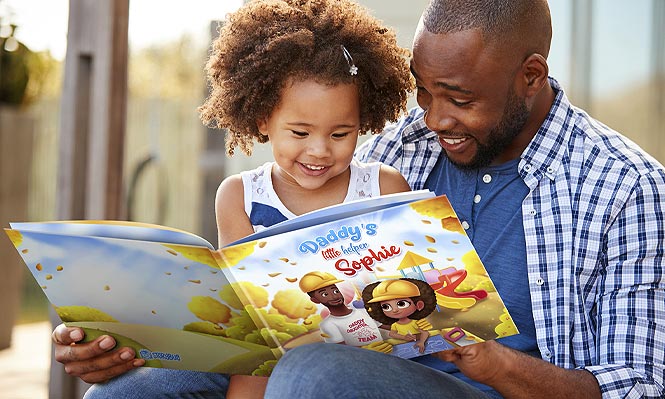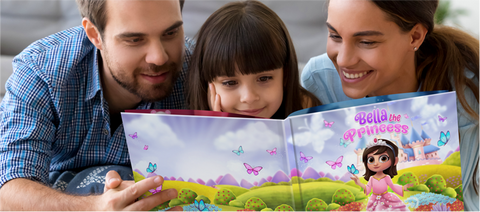Join the Story Bug club
Be first to know about new stories and offers
Encouraging Empathy and Understanding through Personalized Story Books

When I was a child, my parents used to read me bedtime stories every night. It was our special time together, where our imaginations would soar and we would embark on thrilling adventures. But as much as I loved those stories, there was something missing – a connection to the characters and their experiences.
Fast forward to today, and personalized story books have changed the game. These custom-made books are tailored to each child, incorporating their name, appearance, and interests. They create a personal connection that makes every bedtime a unique adventure filled with empathy and understanding.
Imagine a young girl named Sarah, who loves animals. Her personalized story book takes her on a journey to a magical forest where she befriends a diverse group of animal characters. As she turns the pages, she sees herself right there alongside her new friends, exploring unknown territories and learning valuable lessons about empathy, kindness, acceptance, and friendship.
Personalized story books engage children on a deeper level, encouraging them to relate to the characters and situations in the stories. Through these books, children not only expand their imagination but also develop important life skills that will shape their future.

Empathy is a fundamental skill that enables us to understand and connect with others on a deeper level. It plays a crucial role in fostering harmonious relationships, promoting diversity, and building a compassionate society. This is why children's literature has long been recognized as a powerful tool for developing empathy in young minds.
Through the exploration of diverse characters, emotions, and experiences, children's books provide a window into different perspectives and help young readers develop a sense of understanding and compassion. By immersing themselves in the stories, children can learn to empathize with the joys, struggles, and triumphs of the characters.
"Reading gives us the ability to walk in someone else's shoes and understand their world."
Research has shown that exposure to empathy-building storybooks can enhance cognitive and emotional empathy skills in children. By engaging with stories that depict a wide range of emotions and situations, young readers learn to recognize and relate to the experiences of others.
Moreover, children's literature often incorporates themes of friendship, kindness, acceptance, and diversity, all of which are essential components of empathy. By encountering these messages in stories, children are encouraged to embrace these values and apply them in their own lives.
Empathy-building storybooks not only provide an entertaining reading experience but also have a lasting impact on children's development.
Empathy is closely linked to pro-social behaviors, such as kindness, sharing, and helping others. When children develop empathy through literature, they become more inclined to engage in these positive behaviors, fostering a sense of community and collaboration.
Reading stories that explore different cultures, backgrounds, and experiences helps children develop an appreciation for diversity. By exposing young readers to characters from various walks of life, children's literature promotes inclusivity and acceptance.
Children's literature has the power to shape young minds, fostering empathy, compassion, and a deep appreciation for the beauty of our differences.
Storybooks have the unique ability to transport children to different worlds, introduce them to new ideas and perspectives, and evoke emotions. When it comes to empathy development, storybooks play a vital role in helping children understand and relate to the experiences of others.
By immersing themselves in the lives of fictional characters, children can learn to step into someone else's shoes, recognize their emotions, and develop a greater sense of empathy.
The narrative structure of storybooks allows for exploration of complex emotions, moral dilemmas, and social interactions, providing children with valuable opportunities for empathy-building.
When it comes to fostering empathy in young readers, storybooks play a vital role. Empathy in storybooks can be understood through three key components:
By incorporating these empathy components into storylines and character development, personalized storybooks provide a rich and immersive reading experience that effectively nurtures empathy in young readers.

Language is not just a tool for communication; it is a gateway to empathy. Through storytelling and carefully crafted language, storybooks offer children a safe space to explore complex emotions, moral dilemmas, and social interactions. As children engage with stories that depict characters facing challenges, making difficult decisions, and navigating relationships, they learn to understand and relate to the experiences of others, honing their empathetic skills.
With language as its catalyst, storybooks have the extraordinary ability to inspire empathy, cultivate compassion, and shape the moral compass of young minds. Through the power of words, storybooks help children develop into empathetic individuals who value kindness, understanding, and acceptance.
In addition to empathy development, personalized story books have the power to instill various other essential life skills in children. These books go beyond teaching empathy and provide valuable lessons about kindness, acceptance, resilience, problem-solving, and conflict resolution.
Through relatable stories and interactive activities, personalized story books empower children to navigate real-life situations and develop a strong moral compass. By incorporating a range of life skills, these books become powerful tools for holistic growth and development in children.
Personalized story books create opportunities for children to learn about kindness in a meaningful way. By portraying acts of kindness through relatable characters and storytelling, these books inspire children to show compassion and empathy towards others.
Personalized story books also promote acceptance by depicting diverse characters and exploring different perspectives. These books help children understand and appreciate individual differences, fostering a culture of inclusivity and respect.
Resilience is an important life skill that children can learn through personalized story books. These books often feature characters who face challenges and overcome adversity, teaching children the importance of perseverance, problem-solving, and bouncing back from setbacks.
Personalized story books offer opportunities for children to develop problem-solving skills. As they engage with the characters and storylines, children can analyze situations, think critically, and come up with creative solutions. This helps them build their problem-solving abilities, which are essential for navigating real-world challenges.
Conflict resolution is another vital life skill that personalized story books can teach children. By presenting characters who encounter conflicts and work towards peaceful resolutions, these books teach children effective communication, empathy, and negotiation skills.
"Personalized story books provide valuable lessons that extend beyond empathy development. They empower children with the essential tools they need to navigate the complexities of life with kindness, acceptance, resilience, problem-solving, and conflict resolution."
- Emily Bennett, Child Development Specialist
Incorporating a range of life skills, personalized story books have a significant impact on the holistic growth and development of children. These books become an integral part of a child's learning journey, equipping them with essential skills that they can carry with them into adulthood.
The impact of personalized story books on children is profound. These books have a transformative effect on various aspects of their development, nurturing empathy and understanding while promoting essential skills and positive self-concept.
Personalized story books not only foster empathy but also contribute to the overall development of children. Through these books, children embark on literary journeys that not only ignite their imagination and creativity but also enhance their literacy skills. As they engage with the characters and storylines, children develop their language abilities, vocabulary, and reading comprehension.
The personalized nature of these books plays a significant role in shaping children's self-esteem. By seeing their own name and appearance within the pages, children feel a sense of value, recognition, and empowerment. This personal connection fosters a positive self-concept and a deep sense of belonging, boosting their confidence and self-worth.
"Personalized story books create a magical experience that captivates children, impacting their emotional, cognitive, and social development"
- Dr. Sarah Thompson, Child Psychologist
The impact of personalized story books extends far beyond childhood. These books lay a strong foundation for lifelong learning, fostering a love for reading and storytelling that can last a lifetime. The lessons in empathy, kindness, and acceptance learned through personalized story books become an integral part of a child's moral compass, shaping their actions and relationships as they grow into adulthood.
Personalized story books have revolutionized children's literature by harnessing the power of empathy-building. These books not only capture children's attention but also create personal connections that deepen their understanding of diverse emotions and social interactions. Through carefully crafted storytelling and the incorporation of empathy-related components, personalized story books contribute significantly to the emotional and social development of young readers. Why not order one from our extensive selection for your toddler today?
 Bedtime Stories: Tips for..
Are bedtime stories beneficial for toddler sleep routines?
Jan 8, 2024
Bedtime Stories: Tips for..
Are bedtime stories beneficial for toddler sleep routines?
Jan 8, 2024
 Girls Books to Inspire and Empower..
For young girls, seeing themselves represented as the protagonist in a story can have an enormous impact.
Jan 9, 2023
Girls Books to Inspire and Empower..
For young girls, seeing themselves represented as the protagonist in a story can have an enormous impact.
Jan 9, 2023
 Reading as a Family..
Picture this: cuddling up with your little one and opening a book that is specially made for them.
Jan 17, 2023
Reading as a Family..
Picture this: cuddling up with your little one and opening a book that is specially made for them.
Jan 17, 2023